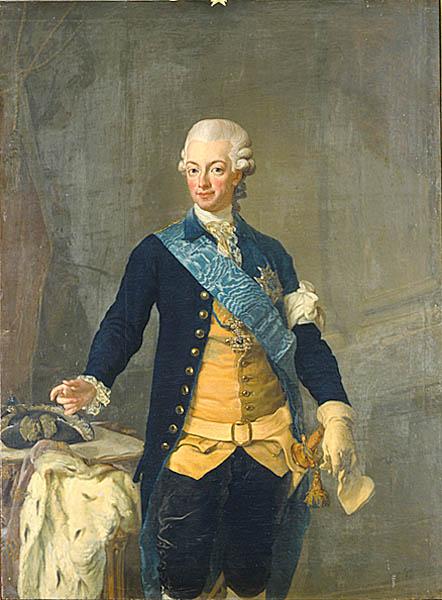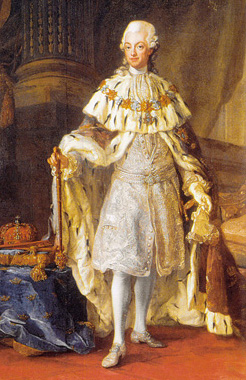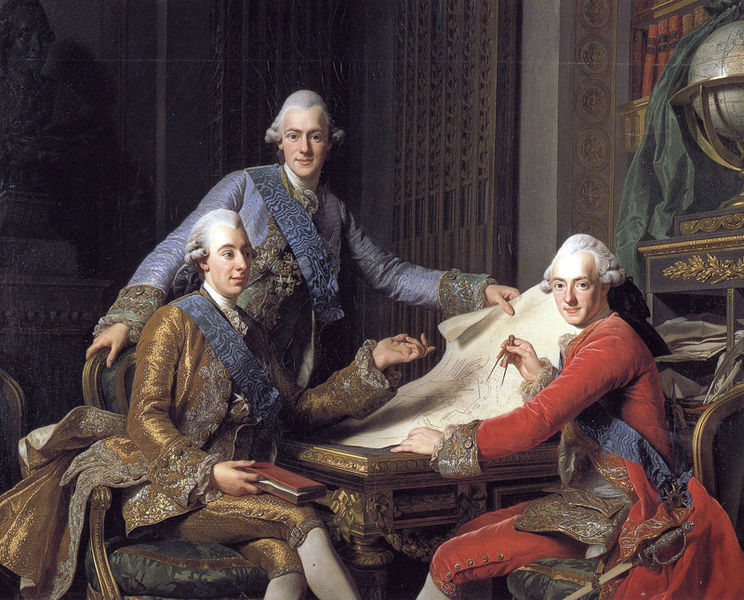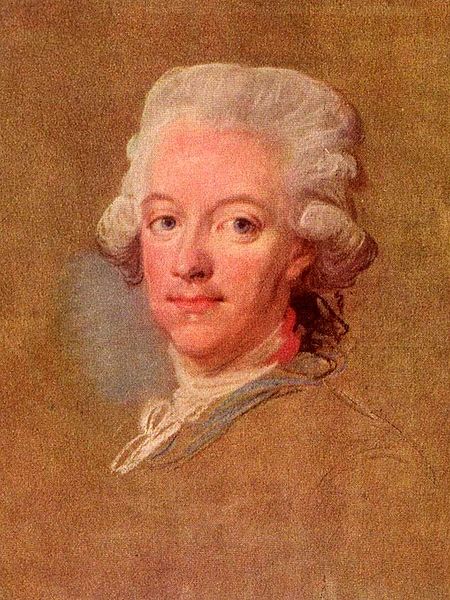<Back to Index>
- Surveyor Andrew Ellicott, 1754
- Opera Singer Farinelli (Carlo Maria Broschi), 1705
- King of Sweden Gustav III, 1746
PAGE SPONSOR


Gustav III (Stockholm, 24 January [O.S. 13 January] 1746 – Stockholm, 29 March 1792) was King of Sweden from 1771 until his death. He was the eldest son of King Adolf Frederick of Sweden and Louisa Ulrika of Prussia, sister of Frederick the Great.
A vocal opponent, as he saw it, of abuses by the nobility of a permissiveness established by parliamentarian reforms that had been worked out before his reign (the so called Age of Liberty), he enacted the Act of Union and Security to reinstate absolute monarchy with himself as autocrat.
His expenditure of considerable public funds on things that pleased him
contributed as well to making him controversial. Gustav tried to
maintain Sweden's eastern borders, even hoping to expand them, through a war against Russia which was not completely successful. He was assassinated by a conspiracy of noblemen claiming thus only to commit tyrannicide, but it has been shown that they also had more personal motives. Gustav III was a benefactor of arts and literature. He founded several academies, among them the Swedish Academy, created a National Costume and had the Royal Swedish Opera built. In 1772 he founded the Royal Order of Vasa to acknowledge and reward those Swedes who had helped to advance process in the fields of agriculture, mining and commerce.
Gustav was educated under the care of two governors who were amongst the most eminent Swedish statesmen of the day, Carl Gustaf Tessin and Carl Fredrik Scheffer; but he owed most perhaps to the poet and historian Olof von Dalin. The interference of the state with his education, when he was quite a child was however doubly harmful, as his parents taught him to despise the preceptors imposed upon him by the Estates of the Realm, and the atmosphere of intrigue and duplicity in which he grew up made him precociously experienced in the art of dissimulation. But even his most hostile teachers were amazed by the alliance of his natural gifts, and, while still a boy, he possessed that charm of manner which was to make him so fascinating and so dangerous in later life, coupled with the strong dramatic instinct which won for him his honourable place in Swedish literature. On the whole, Gustav cannot be said to have been well educated, but he read very widely; there was scarcely a French author of his day with whose works he was not intimately acquainted; while his enthusiasm for the new French ideas of enlightenment was as sincere as, if more critical than, his mother's.
By proxy in Christiansborg Palace, Copenhagen, on 1 October 1766 and in person in Stockholm on 4 November 1766, Gustav married Princess Sophia Magdalena, daughter of King Frederick V of Denmark. The match was not a happy one, owing partly to an incompatibility of temper; but still more to the interference of the jealous Queen Mother. The marriage produced two children: Crown Prince Gustav Adolf (1778 – 1837), and Prince Carl Gustav, Duke of Småland (Drottningholm, 25 August 1782 – Stockholm, 23 March 1783). For the consummation of the marriage, the king requested the assistance of Adolf Munck, reportedly because of anatomical problems both spouses possessed. Gustav's mother supported rumors that he was not the father of his first son and heir. It was rumored at the time that Gustav indulged in homosexuality. The close personal relationships he formed with two of his courtiers, Count Axel von Fersen and Baron Gustav Armfelt, were alluded to in that regard. His sister - in - law implied as much in a diary. Professor Erik Lönnroth of the Swedish Academy has concluded that there is no factual basis for the assumption that Gustav III was homosexual.
Gustav first intervened actively in politics in 1768, when he compelled the dominant Cap faction to summon an extraordinary diet from which he hoped for the reform of the constitution in a monarchical direction. But the victorious Hat party refused to redeem the pledges which they had given before the elections. "That we should have lost the constitutional battle does not distress us so much", wrote Gustav, in the bitterness of his heart; "but what does dismay me is to see my poor nation so sunk in corruption as to place its own felicity in absolute anarchy."
He was an enthusiast of Sweden's national history, and proudly held in memory that he descended, through his paternal grandmother, from the House of Vasa: from king Gustav I of Sweden and from a sister of Charles X Gustav of Sweden.
From 4 February to 25 March 1771, Gustav was in Paris, where he carried both the court and the city by storm. The poets and the philosophers paid him enthusiastic homage, and distinguished women testified to his superlative merits. With many of them he maintained a lifelong correspondence. His visit to the French capital was, however, no mere pleasure trip; it was also a political mission. Confidential agents from the Swedish court had already prepared the way for him, and the Duke of Choiseul had resolved to discuss with him the best method of bringing about a revolution in France's ally, Sweden. Before he departed, the French government undertook to pay the outstanding subsidies to Sweden unconditionally, at the rate of one and a half million livres annually; and Count de Vergennes, one of the great names of French diplomacy, was transferred from Constantinople to Stockholm.
On his way home Gustav paid a short visit to his uncle, Frederick the Great, at Potsdam. Frederick bluntly informed his nephew that, in concert with Russia and Denmark,
he had guaranteed the integrity of the existing Swedish constitution,
and significantly advised the young monarch to play the part of
mediator and abstain from violence.
On his return to Sweden Gustav III tried to mediate between the bitterly divided Hats and Caps. On 21 June 1771, he opened his first Riksdag of the Estates (parliament) with a speech which aroused powerful emotions. It was the first time for more than a century that a Swedish king had addressed a Swedish Riksdag in its native tongue. He stressed the need for all parties to sacrifice their animosities for the common good, and volunteered, as "the first citizen of a free people," to be the mediator between the contending factions. A composition committee was actually formed, but it proved illusory from the first, the patriotism of neither of the factions being equal to the puniest act of self denial. The subsequent attempts of the dominant Caps to reduce him to a roi fainéant (a powerless king), encouraged him to consider a revolution.
Under the sway of the Cap faction, Sweden seemed threatened with falling prey to Russia. It appeared on the point of being absorbed in that "Northern System" which the Russian vice-chancellor, Count Nikita Panin, strove to bring about. It seemed that only a swift and sudden coup d'état could preserve Sweden's independence. At this juncture Gustav III was approached by Jacob Magnus Sprengtporten, a Finnish nobleman, who had incurred the enmity of the Caps, with the project of a revolution. He undertook to seize the fortress of Sveaborg by a coup de main, and once Finland was secured, to embark for Sweden, join up with the king and his friends near Stockholm, and force the estates to accept a new constitution from the untrammelled king. The plotters were at this juncture reinforced by Johan Christopher Toll, also a victim of Cap oppression. Toll proposed to raise a second revolt in the province of Scania, and to secure the southern fortress of Kristianstad. After some debate, it was finally arranged that, a few days after the Finnish revolt had begun, Kristianstad should openly declare against the government. Duke Charles (Karl), the eldest of the king's brothers, would thereupon be forced to hastily mobilize the garrisons of all the southern fortresses, for the ostensible purpose of crushing the revolt at Kristianstad; but on arriving before the fortress he was to make common cause with the rebels, and march upon the capital from the south, while Sprengtporten attacked it simultaneously from the east.
The entire revolutionary enterprise was underwritten with loans procured from the French financier Nicolas Beaujon, arranged by the Swedish ambassador to France, Count Creutz.
On 6 August 1772 Toll succeeded, by sheer bluff, in winning the fortress of Kristianstad. On 16 August Sprengtporten succeeded in surprising Sveaborg. But contrary winds prevented him from crossing to Stockholm, and in the meanwhile events had occurred which made his presence there unnecessary. On 16 August, the Cap leader, Ture Rudbeck, arrived at Stockholm with the news of the insurrection in the south, and Gustav found himself isolated in the midst of enemies. Sprengtporten lay weather bound in Finland, Toll was five hundred miles away, the Hat leaders were in hiding. Gustav thereupon resolved to strike the decisive blow without waiting for the arrival of Sprengtporten.
He acted promptly. On the evening of 18 August all the officers whom he thought he could trust received secret instructions to assemble in the great square facing the arsenal on the following morning. At ten o'clock on 19 August Gustav mounted his horse and rode straight to the arsenal. On the way his adherents joined him in little groups, as if by accident, so that by the time he reached his destination he had about two hundred officers in his suite. After parade he reconducted them to the guard room, which is located in the north western wing of the palace and it is where the Guard of Honour had, and has, its headquarters, and unfolded his plans to them. He told the assembled officers that:
"If you follow me, just like your ancestors followed Gustav Vasa and Gustavus Adolphus, then I will risk my life and blood for you and the salvation of the fatherland!"
A young ensign then spoke up:
"We are willing to sacrifice both blood and life in Your Majesty's service!"
Gustav then dictated a new oath of allegiance, and every one signed it without hesitation. It absolved them from their allegiance to the estates, and bound them solely to obey "their lawful king, Gustav III".
Meanwhile the Privy Council and its president, Rudbeck, had been arrested and the fleet secured.
Then Gustav made a tour of the city and was everywhere received by
enthusiastic crowds, who hailed him as a deliverer. A special song was
also composed by Carl Mikael Bellman called Toast to King Gustav!
A new
Constitution
was read to the estates and unanimously accepted by them. The diet was then dissolved.
Gustav worked towards reform in the same direction as other contemporary sovereigns of the age of enlightenment. Criminal justice became more lenient, the death penalty was removed for many crimes, and torture was abolished.
He took an active part in every department of business, but relied far on extra official counsellors of his own choosing rather than upon the senate. The effort to remedy the widespread corruption that had flourished under the Hats and Caps engaged a considerable share of his time and he even found it necessary to put on trial the entire Göta Hovrätt, the superior court of justice in Jönköping.
Measures were also taken to reform the administration and judicial procedures. In 1774 an ordinance was proclaimed providing for the liberty of the press, though "within certain limits". The national defences were raised to a "Great Power" scale, and the navy was so enlarged as to become one of the most formidable in Europe. The dilapidated finances were set in good order by the "currency realization ordinance" of 1776.
Gustav also introduced new national economic policies. In 1775 free trade in grain was promoted and a number of oppressive export tolls were abolished. The poor law was amended, limited religious liberty was proclaimed for both Roman Catholics and Jews, and Gustav even designed and popularized a national costume, which was in general use among the upper classes from 1778 until his death. (It is still worn by the ladies of the court on state occasions.) The king's one great economic blunder was the attempt to make the sale of alcohol a government monopoly, which clearly infringed upon the privileges of the estates.
His foreign policy, on the other hand, was at first both restrained and cautious. Thus, when the king summoned the estates to assemble at Stockholm on 3 September 1778, he could give a highly positive account of his six years' stewardship. The parliament was quite obsequious towards the king. "There was no room for a single question during the whole session."
Short as the session was, it was quite long enough to open the eyes of the deputies to the fact that their political supremacy had departed. They had changed places with the king. He was now indeed their sovereign lord; and, for all his gentleness, the jealousy with which he guarded, the vigour with which he enforced the prerogative, plainly showed that he meant to remain so. Even those who were prepared to acquiesce in the change by no means liked it. If the diet of 1778 had been docile, the diet of 1786 was mutinous. The consequence was that nearly all the royal propositions were either rejected outright or so modified that Gustav himself withdrew them.
Earlier in foreign affairs, however, and privately, Gustav had shown considerable interest in the American Revolution and had this to say about it in October of 1776:
- It is such an interesting drama to see a nation create itself, that I – if I now had not been who I am – would go to America to follow up close every phase in the emergence of this new republic. – This perhaps is America’s century. The new republic, which hardly has a population put together better than Rome had to begin with, may perhaps take advantage of Europe some day, in the same manner as Europe has taken advantage of America for two centuries. No matter what, I cannot help but admire their courage and enthusiastically appreciate their daring.
The Riksdag of 1786 marks a turning point in Gustav's history. Henceforth he showed a growing determination to rule without a parliament; a passage, cautious and gradual, yet unflinching, from semi - constitutionalism to semi - absolutism.
At the same time his foreign policy became more adventurous. At first he sought to gain Russian support to acquire Norway from Denmark. When Catherine II refused to abandon her ally Denmark, Gustav declared war on Russia in June 1788, while it was deeply engaged in a war with the Ottoman Empire to the south. In embarking on a war of aggression without the consent of the estates, Gustav violated his own constitution of 1772 – which led to a serious mutiny, the Anjala Conspiracy, among his aristocratic officers in Finland. Denmark declared war in support of its Russian ally, but was soon neutralized through British and Prussian diplomacy.
Returning to Sweden, Gustav aroused popular indignation against the mutinous, aristocratic officers, ultimately quelled their rebellion, and arrested its leaders. Capitalizing on the powerful anti - aristocratic passions thus aroused, Gustav summoned a Riksdag early in 1789, at which he put through an Act of Union and Security on 17 February 1789 with the backing of the three lower estates. This powerfully reinforced monarchical authority, even though the estates retained the power of the purse. In return, Gustav abolished most of the old privileges of the nobility.
Throughout 1789 and 1790 Gustav conducted the war with Russia, finally winning the Battle of Svensksund, on 9 July, regarded as the greatest naval victory ever gained by the Swedish Navy. The Russians lost one-third of their fleet and 7,000 men. A month later, on 14 August 1790, peace was signed between Russia and Sweden at Värälä. Only eight months before, Catherine had declared that "the odious and revolting aggression" of the king of Sweden would be "forgiven" only if he "testified his repentance" by agreeing to a peace granting a general and unlimited amnesty to all his rebels, and consenting to a guarantee by the Swedish diet ("as it would be imprudent to confide in his good faith alone") for the observance of peace in the future. The Treaty of Värälä saved Sweden from any such humiliating concession, and in October 1791 Gustav concluded an eight years' defensive alliance with the empress, who thereby bound herself to pay her new ally an annual subsidy of 300,000 roubles.
Gustav now aimed at forming a league of princes against the Jacobins,
and subordinated every other consideration to this goal. His profound
knowledge of popular assemblies enabled him, alone among contemporary
sovereigns, accurately to gauge from the first the scope and bearing of
the French Revolution. He was, however, hampered by poverty and the lack of support from the other European Powers, and, after the brief Gävle diet 22 January – 24 February 1792, he fell victim to a widespread conspiracy among his aristocratic enemies.
A masked ball took place at the Royal Opera House in Stockholm at midnight on 16 March 1792. Gustav had arrived earlier that evening to enjoy a dinner in the company of friends. During dinner, he received an anonymous letter that contained a threat to his life, but, as the king had received numerous threatening letters in the past, he chose to ignore it, and, after dining, left his rooms to take part in the masquerade. Soon upon entering, he was surrounded by Anckarström and his co-conspirators Count Claes Fredrik Horn and Count Adolf Ludvig Ribbing. The king was easily spotted, mainly due to the breast star of the Royal Order of the Seraphim which glowed in silver upon his cape. The conspirators were all wearing black masks and accosted him in French with the words:
- Bonjour, beau masque ("Good-day, fine mask")
Anckarström moved in behind the King and fired a pistol shot into the left side of his back. The King jumped aside, crying in French:
- Ah! Je suis blessé, tirez-moi d'ici et arrêtez-le ("Ah! I am wounded, take me away from here and arrest him!")
The King was immediately carried back to his quarters, and the exits of the Opera were sealed. Anckarström was arrested the following morning, and immediately confessed to the murder, although he denied a conspiracy until informed that Horn and Ribbing had also been arrested and had confessed in full.
The king had not been shot dead, but was alive, and continued to function as head of state. The coup was a failure in the short run. However, the wound became infected and on 29 March he finally died, his last words being:
- Jag känner mig sömnig, några ögonblicks vila skulle göra mig gott ("I feel sleepy, a few moments rest would do me good")
Ulrica Arfvidsson, the famous medium of
the Gustavian era, had told him something that could be interpreted as
a prediction about it in 1786 when he visited her anonymously – a
coincidence, but she was known to have a large network of informers all
over town to help her with her predictions, and was in fact
interrogated about the murder.
Although he may be charged with many foibles and extravagances, Gustav III is regarded one of the leading sovereigns of the 18th century being fond of performing and visual arts as well as literature. His historical essays, notably the famous anonymous eulogy on Lennart Torstenson crowned by the Swedish Academy, which he established in 1786, are full of feeling and exquisite in style, his letters to his friends are delightful. Every branch of literature and the arts interested him, every poet and artist of his day found in him a liberal and sympathetic protector. Gustav was also active as a playwright. He is largely credited with creating the Royal Theatre, (Kungliga Teatern), where his own historical dramas were performed, and he promoted the careers of many native singers and actors, among them the dramatic stars Fredrique Löwen and Lars Hjortsberg and the operatic stars Elisabeth Olin and Christoffer Christian Karsten, by letting them perform in his plays or in his commissioned operas, respectively. In 1773 he founded the Royal Swedish Opera and the Royal Swedish Ballet, under the umbrella of his Royal Theatre (Kungliga Teatern). A new opera house was built in 1775 and inaugurated in 1782, connected to the Stockholm Palace by the Norrbro bridge. Until 1788 also Drama was performed in the opera house; Gustav III then founded a separate entity for drama, the Royal Dramatic Theatre with a new building behind the Royal Swedish Opera house.
He became a Freemason in 1780, and introduced the Rite of Strict Observance into Sweden. That year, he named his brother, the Duke of Södermanland (later Charles XIII), to the office of Grand Master for the Grand Lodge of Sweden. The Grand Lodge conferred upon him the title "Vicarius Salomonis" (Vicar of Solomon).
Notable opera composers under Gustav's reign were the three originally German artists Johann Gottlieb Naumann and Georg Joseph Vogler as well as Joseph Martin Kraus. All of them succeeded in the attempt to combine their musical origin with the national dramatic style which, sometimes, was overseen by the king (notably in the layout of the libretto for the opera Gustav Wasa from 1786).
It was in the foyer of the opera house where King Gustav III met his fate: during a masquerade on March 16, 1792, he was shot by Jacob Johan Anckarström, and died 7 days later. The assassination of Gustav III became the basis of an opera libretto by Scribe, set by both Daniel Auber in 1833 under the title Gustave III, and, with the specifics changed by censorship, by Giuseppe Verdi in 1859 as Un ballo in maschera (A Masked Ball).
It is widely agreed that the contribution and dedication of Gustav III to the performing arts in Sweden, notably the building of the theatre houses as well as the foundation of a national theatre company, has been crucial and vital to the Swedish culture up and until today. The era of opera during his time is referred to today as the Gustavian Opera.
It was under King Gustav III that Sweden gained in 1785 the small Caribbean island of Saint - Barthélemy from France, in exchange for French trading rights in Gothenburg. The island's capital bears up to the present the name Gustavia in honour of Gustav III. Though it was sold back to France in 1878, many streets and locations there still bear Swedish names. Also, the Swedish national arms, the three crowns along with the grey heron, still appear in the island's coat of arms.
Just at the time when the British were preparing to colonise Botany Bay, the Government of Gustav III agreed to sponsor William Bolts's proposal for an equivalent colonisation venture in Nuyts Land (the south western coast of Australia). The war with Russia caused this venture to be abandoned.

